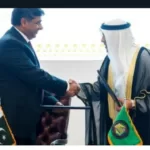In a recent development, the International Olympic Committee (IOC) has affirmed that athletes participating in the Paris 2024 Olympic Games will have the liberty to don hijabs within the athletes’ village without any constraints. This announcement comes hot on the heels of France’s Sports Minister, Amelie Oudea-Castera, imposing a ban on the wearing of hijabs by French athletes during the Paris Games in adherence to the principles of secularism.
The IOC, in response, expressed its commitment to upholding its regulations within the Olympic Village, asserting, “There are no restrictions on wearing the hijab or any other religious or cultural attire.”
The Olympic Village, which accommodates the vast majority of the approximately 10,000 athletes, features shared spaces including dining halls and recreational areas. Within this environment, the IOC’s rules stand supreme.
However, a nuanced distinction emerges concerning competitions, as the spokesperson clarified, “When it comes to competitions, the regulations set by the relevant International Federation apply.” The intricacies of sports competitions at the Olympics fall under the purview of individual international sports federations.
Notably, the contentious decision to prohibit hijabs applies exclusively to members of the French team. Consequently, the IOC has initiated communication with the French Olympic Committee (CNOSF) to gain deeper insights into the dynamics surrounding French athletes and their participation.
France, home to one of Europe’s largest Muslim populations, has instituted stringent laws aimed at safeguarding its unique form of secularism known as “laicité.” President Emmanuel Macron has asserted that this secularism faces challenges from Islamism, driving the implementation of these laws.
Critics, including various Muslim associations and human rights groups, contend that these laws disproportionately affect Muslims, erode democratic safeguards, and leave this community vulnerable to discrimination and mistreatment. The United Nations human rights office has openly criticized France’s decision to restrict hijab-wearing by its athletes.
As the world anticipates the Paris Summer Olympics slated to take place from July 26 to August 11 next year, the clash between religious freedom and secularism remains a prominent and contentious issue on the global stage.
By Reuters




